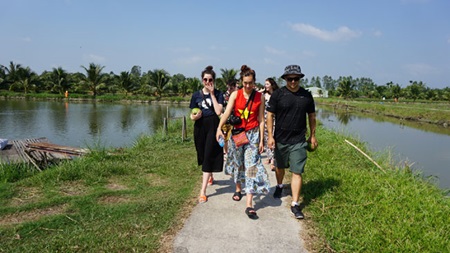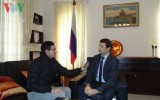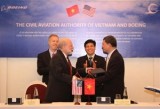NZ students gain VN insights
A collective cheer went up from the young students as a large school of fish surfaced in a pond in Can Tho City, rushing to eat the feed scattered by a farm worker.

Minutes earlier, they'd peppered staff of the 20ha farm with questions on business operations, revenue, markets, jobs and salaries.
Maintained by the Phu Thuan Fisheries Company, the farm is one of several dozen in the city that meet GlobalGAP standards, the students learnt.
They'd visited the pangasius catfish farm after a tour of the Cai Rang Floating Market in Can Tho, which was also an eyeopener.
"It was a wonderful experience," said Josh van Veen, 25, a graduate of Victoria University in Wellington, New Zealand.
Currently working on his master's in political science and international relations, van Veen said: "We had the opportunity to experience local culture. It was very different from what I knew earlier. The visit to Vietnam has been an eye-opening experience.
"The people were very warm and friendly and the weather was nice. There were many beautiful sites."
The students are on an Asian tour which is part of winning a fellowship awarded by the Prime Minister of New Zealand.
‘This group of students was not the first, and they will not be the last one from New Zealand to come to Vietnam. With this programme, we want to give young New Zealanders the chance to experience and see for themselves what is happening here, in particular the energy and dynamism of Vietnam," said New Zealand Ambassador Haike Manning.
He said the programme helps connect the people of both countries.
When the free trade agreement that New Zealand and Vietnam are currently negotiating becomes a reality, fish farms like the one the students visited in Can Tho will have more market choices for their products if they meet their destination market's standards.
As the students walked around the farm, they learnt more about fish farming practices in Vietnam. The one they were visiting produces on average 600 tonnes of pangasius catfish annually. The output can go up to 950 tonnes.
They learnt that Vietnam's aquaculture production has grown at an annual rate of more than 12% in recent years and that Mekong Delta accounts for over 70% of the total aquaculture area and production in the whole country.
"This trip to Vietnam helped me know more about the structure of its economy," said Ed Haslam, 20, a student majoring in economics at the Victoria University in Wellington, New Zealand.
"In New Zealand, we buy ocean fish from Southeast Asia countries, but this freshwater fish has high quality. Maybe it can become more premium product in New Zealand."
Almost all of the students saw opportunities for greater co-operation between the two countries.
"Environmental standards on the Mekong River is one of my concerns," Haslam said.
"In New Zealand we have high environmental standards. All waste must be treated before it is discharged, but you don't have the same level of concern about the environment at the moment. I see an opportunity for co-operation here," he added.
Christina Wray, 20, also a student of Victoria University, said she hoped to return to Vietnam as a diplomat.
"I want to become a politician," said van Veen. "I will return to Vietnam one day and visit Hanoi again.
When visiting the fish farm in the Mekong Delta, I could see a lot of scope for co-operation between Vietnam and New Zealand, especially in agriculture and aquaculture.
"We already have strong relations between our countries, but there is much potential for improvement in the future. In my assignment on New Zealand's relations with Southeast Asia, I think I will focus on Vietnam."
VNS/VOV.VN
Vietnam, Canada enhance cooperation, connections
Vietnam, Italy seek to further expand economic, investment cooperation
Vitenam, Italy seek to further step up locality-to-locality cooperation
Vietnam, Japan work to materialise comprehensive strategic partnership
Argentina hopes to foster economic, trade, investment collaboration with Vietnam
 Seminar held to promote Vietnam - Algeria economic relations
Seminar held to promote Vietnam - Algeria economic relations
 Vietnam, France enhance transport cooperation
Vietnam, France enhance transport cooperation
 Vietnam, Singapore deepen economic, energy cooperation
Vietnam, Singapore deepen economic, energy cooperation
 Vietnam keen on expanding trade, investment cooperation with Ireland: Minister
Vietnam keen on expanding trade, investment cooperation with Ireland: Minister
 International integration drives Vietnam’s economic growth
International integration drives Vietnam’s economic growth



